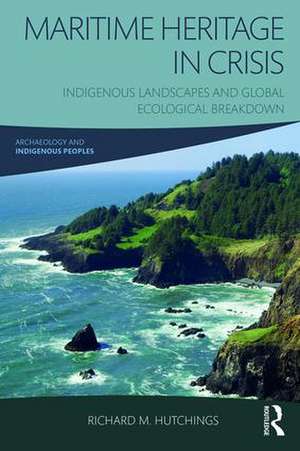Maritime Heritage in Crisis: Indigenous Landscapes and Global Ecological Breakdown: Archaeology and Indigenous Peoples
Autor Richard M. Hutchingsen Limba Engleză Paperback – 7 dec 2016
Exploring themes of colonial dislocation and displacement, Hutchings positions North American archaeology as neoliberal statecraft: a tool of government designed to promote and permit the systematic clearance of Indigenous heritage landscapes in advance of economic development. Presenting the institution of archaeology and cultural resource management as a grave threat to Indigenous maritime heritage, Maritime Heritage in Crisis offers an important lesson on the relationship between neoliberal heritage regimes and global ecological breakdown.
Preț: 295.74 lei
Preț vechi: 354.73 lei
-17% Nou
Puncte Express: 444
Preț estimativ în valută:
56.61€ • 61.51$ • 47.58£
56.61€ • 61.51$ • 47.58£
Carte tipărită la comandă
Livrare economică 21 aprilie-05 mai
Preluare comenzi: 021 569.72.76
Specificații
ISBN-13: 9781629583488
ISBN-10: 1629583480
Pagini: 160
Dimensiuni: 152 x 229 x 8 mm
Greutate: 0.27 kg
Ediția:1
Editura: Taylor & Francis
Colecția Routledge
Seria Archaeology and Indigenous Peoples
Locul publicării:Oxford, United Kingdom
ISBN-10: 1629583480
Pagini: 160
Dimensiuni: 152 x 229 x 8 mm
Greutate: 0.27 kg
Ediția:1
Editura: Taylor & Francis
Colecția Routledge
Seria Archaeology and Indigenous Peoples
Locul publicării:Oxford, United Kingdom
Cuprins
List of figures
List of tables
List of boxes
Preface
List of abbreviations
1. The Maritime Heritage Crisis
2. Coastal Change
3. Cultural Resource Management
4. The shíshálh Coast Study
5. Problematizing the Heritage Crisis
6. Looking Forward, Looking Back
Appendix: The Club of Rome's Forty-Nine Critical Continuous Problems
References
Index
List of tables
List of boxes
Preface
List of abbreviations
1. The Maritime Heritage Crisis
2. Coastal Change
3. Cultural Resource Management
4. The shíshálh Coast Study
5. Problematizing the Heritage Crisis
6. Looking Forward, Looking Back
Appendix: The Club of Rome's Forty-Nine Critical Continuous Problems
References
Index
Notă biografică
Richard M. Hutchings is a founding director of the Institute for Critical Heritage and Tourism, British Columbia, Canada. Born and raised in Seattle, Washington, he obtained his M.A. from Western Washington University, Bellingham, and his Ph.D. from the University of British Columbia, Vancouver. He resides on Gabriola Island in the Salish Sea.
Recenzii
"This volume considers the threat to indigenous archaeological sites through the lenses of colonialism, imperialism, modernity and memory."
Claire Nesbitt, New Book Chronicle
"Richard Hutchings’ Maritime Heritage in Crisis speaks out against the destruction of Indigenous heritage landscapes, tracking the ways in which rising sea levels and population growth have wreaked havoc to the coastal lands of the shíshálh First Nation people located in the Pacific Northwest, as well as the shortcomings—even harms—of external cultural resource management (CRM).[...] The work’s critique of both CRM and the field of archaeology alongside the emphasis on Indigenous rights to collective land management all set this book apart from others on the subject of climate change and coastal landscapes."
Sierra Watt, University of Kansas
Claire Nesbitt, New Book Chronicle
"Richard Hutchings’ Maritime Heritage in Crisis speaks out against the destruction of Indigenous heritage landscapes, tracking the ways in which rising sea levels and population growth have wreaked havoc to the coastal lands of the shíshálh First Nation people located in the Pacific Northwest, as well as the shortcomings—even harms—of external cultural resource management (CRM).[...] The work’s critique of both CRM and the field of archaeology alongside the emphasis on Indigenous rights to collective land management all set this book apart from others on the subject of climate change and coastal landscapes."
Sierra Watt, University of Kansas
Descriere
Maritime heritage landscapes are undergoing a period of unprecedented crisis, severely impacted by coastal development, population growth and climate change. Presenting archaeology and CRM as a grave threat, this volume offers an important lesson on the relationship between neoliberal heritage regimes and global ecological breakdown.








